4Chamomile Tea For Sleep

Advertisements
People have used chamomile tea for sleep for thousands of years. Studies seem to back up its calming effect. One Japanese study of rats found that chamomile extract helped the rats fall to sleep just as quickly as rats that got a dose of benzodiazepine (a tranquilizing medication). Better research of chamomile is needed, experts agree. The FDA considers chamomile tea to be safe with usually no side effects.
Plank says: “The trick is to make sure you are brewing it properly. Use two or three tea bags. Then put a lid on the pot to keep oils in the water — so you get the medicinal effects of the tea.”
Use chamomile cautiously if you are allergic to ragweed (the plants are related). Also, don’t take chamomile tea if you are pregnant or nursing.
3Melatonin For Sleep

Melatonin is a natural hormone that helps regulate the sleep-wake cycle (circadian cycles). Studies show that melatonin not only helps some people fall asleep, but also enhances the quality of sleep.
“Melatonin comes in two forms – extended release and immediate release,” says Plank. “If you tend to wake up in the middle of the night, you may want to take extended release before you go to bed. If you have trouble falling asleep, try immediate release.”
Also, “melatonin supplements can be effective in treating certain sleep disorders, including jet lag,” says Avidan. But studies suggest you must time the melatonin you take carefully to help with jet lag.
On the day you depart, take melatonin when it is bedtime at your destination. Continue taking it for several days. It works best when traveling eastward and when crossing four or more time zones.
Advertisements
A few cautions: Melatonin is considered generally safe for short-term use. However, there have been concerns about risks of bleeding (especially in people taking blood-thinners like warfarin). There also is increased risk of seizure, particularly in children with brain disorders.
2Valerian For Sleep

Valerian root has been used as a sedative and anti-anxiety treatment for more than 2,000 years.
A review of 16 small studies suggests that valerian may help people fall to sleep faster. It also may improve the quality of sleep. Valerian becomes more effective over time, so it’s best to take it every night for a short period of time.
Some people have stomach upset, headache, or morning grogginess with valerian. Taking valerian with sleeping medications or with alcohol can compound its effect, so don’t use it with other sleep aids.
Start with the lowest dose, then increase over several days’ time. Valerian is considered safe to take for four to six weeks.
1Kava For Sleep

Advertisements
The Kava plant is a member of the pepper family, and has been shown to help relieve anxiety. One review of six studies showed reduced anxiety among patients who took kava, compared with those who got a placebo. Another small study showed that both kava and valerian improved sleep in people with stress-related insomnia.
The American Academy of Family Physicians says that short-term use of kava is okay for patients with mild to moderate anxiety – but not if you use alcohol or take medicines metabolized in the liver, including many cholesterol medicines.
In fact, the FDA has issued a warning that using kava supplements has been linked to a risk for severe liver damage. Before taking kava, ask your doctor if kava is safe for you.





Comments